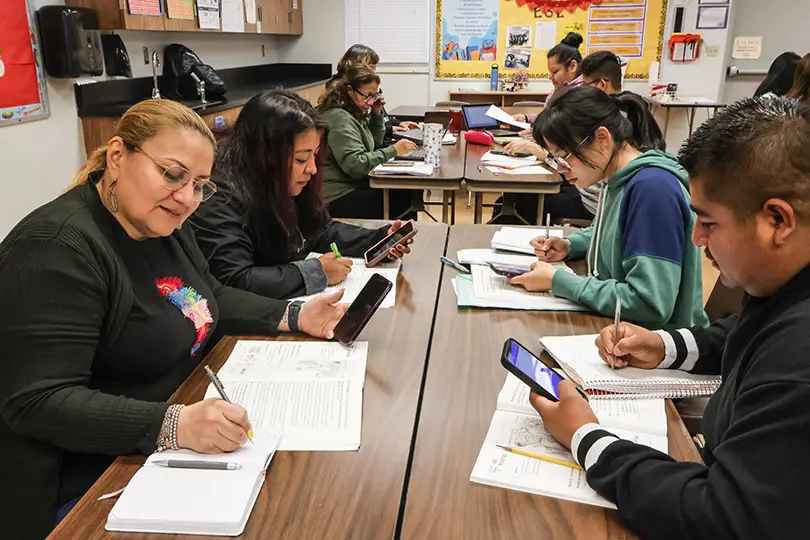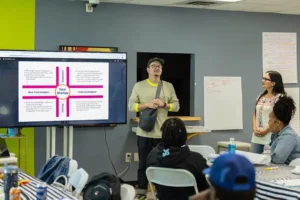For years Xanthi Soriano has seen firsthand how lives can improve through adult education programs. She started that journey in Irvine, California, by teaching English as a Second Language (ESL) before moving to Sacramento County, where she later put those skills to work again while instructing adult courses for the Folsom Cordova Unified School District.

“It’s a lot of fun, and many of the people I’ve worked with are parents who have children in our schools throughout the county,” says Soriano, who’s now the executive director of communications for the Sacramento County Office of Education as she continues to teach ESL part-time. “It’s a great way to connect parents with their kids through family and community engagement; and the participants are really just go-getters who want to try their best to learn English, or they want to gain other skills.”
She adds, “It’s a great resource in the community.”
But the future of that resource has been under a cloud for months now, and a lack of clarity about how much federal assistance will be provided in 2026 has only been exacerbated by the government shutdown.
Adult education programs in California are partly paid for by federal funds from the Workforce Innovation and Opportunity Act, or WIOA, which are supplemental grants designed to help Americans sharpen their employment opportunities, expand their career options, and become more self-determined and independent as they find their best place in the workforce.
WIOA funds are also used, historically, to help immigrants expand their economic horizons through ESL courses.
The challenges started in early July when the Trump Administration tried to withhold distributing $6 billion in congressionally approved education funds across the country, including $715 million in WIOA funds. On July 14, California Attorney General Rob Bonta co-lead a coalition of 23 state attorney generals in suing the White House over the funding freeze. The AGs’ legal complaint specifically mentions the seized WIOA dollars.
“The ED Funding Freeze also severely impacts the States’ adult education systems,” the attorney generals wrote. “Across the Plaintiff States, hundreds of thousands of adult learners — including English language learners and those working toward a high school diploma — depend on services funded by the Workforce Innovation and Opportunity Act (WIOA). … These programs provide foundational instruction in reading, math, English language acquisition, high school equivalency preparation.”
Before the case was adjudicated, the Trump Administration released the funds on July 25.
But sighs of relief were short-lived in the adult education world. While the summer’s briefly ensnared WIOA funds had been approved by Congress, there is no guarantee that lawmakers on Capitol Hill will approve WIOA funds for the coming 2026-2027 fiscal year. At the moment, the U.S. Senate Appropriations Committee has approved a budget proposal for next year that includes WIOA funding for adult literacy, though Republican leaders in the U.S. House of Representatives have made no such commitment.

In California, the WIOA funds that are on the line equal roughly $117 million for adult education across the 58 counties, according to multiple sources who work in the field.
“Obviously, that kind of cut would shift a lot of burden to localities, which have their own funding problems, like with K-12 schools and other local city-county services — so that’s the biggest risk,” stresses Dave Gordon, superintendent of the Sacramento County Office of Education. “The demand for ESL is off the charts in the urban regions. It’s a little more mixed in the suburban regions, but there’s definitely a huge demand for adult ESL. That’s our largest adult education program.”
The Sacramento County Office of Education’s ESL program serves 43% of the region’s enrollees. Region-wise, adult education, in general, went from 8,200 to over 12,000 between the 2023/2024 year and 2024/2025. Demand continues to be on the rise, according to SCOE officials.
Gordon notes those numbers apply mainly to Sacramento County, though they include a few programs in nearby cities in the area. According to him, the second largest offering in demand at Sacramento’s adult education programs is career technical training, which is important to provide due to labor shortages in fields like phlebotomy and medical assistance. The third largest area where adult programs are seeing the most enrollees, Gordon observes, involves locals getting their high school diploma.
A 2020 longitudinal study of adult learning by Portland State University linguistics professor Stephen Reder suggests that the kind of support that Gordon describes amounts to a net benefit to the U.S. and yields genuine returns on the tax payer investment. Reder found that participants enrolled in Adult Basic Skills (ABS) — an element of what’s taught in California’s adult education programs — show a dramatic increase in income over time, and students are more likely to pursue secondary education. In other words, they end up being higher contributing tax payers.
Gordon says he has poured over a number of different data points that demonstrate such benefits. But he also knows what he sees with his own eyes in Sacramento’s adult classrooms.
“The No.1 benefit is that the classes are ever-welcoming to anyone and everyone who seeks to better themselves,” Gordon reflects. “And the vibe in the programs is extremely positive and restorative. The No. 2 benefit is that the training is of good quality. And the third big benefit is that attendees are now connected to a system which is connected to other systems. If some want to become a citizen, they’re connected to a program to make them a citizen. We have connections with the major employers in Sacramento County, too, and that means participants are connected to opportunities once they’re finished with their classes.”
Steve Curiel, who’s worked in adult education for 25 years, says that, historically, it was California state funds that were more precarious and unreliable than federal dollars. Curiel is the principal at Huntington Beach Adult School in Orange County. He mentions that the current federal drama feels new, though the stakes are as high as ever for would-be learners.
“If people were to take a look at the numbers, they’d see that one-in-five adults in California does not have a diploma, and that is considered low-literacy,” Curiel points out. “And thinking about a growing economy with jobs requiring higher skills, those folks are at a disadvantage when trying to seek work or maintain work. Those funds we receive through WIOA go to direct supports for participants to get their high school diploma or equivalent, or learn English so they can get on a path for a high school diploma.”
Adult learners across the state have been contacting their senators and representatives in the House about the threatened funds, according to Curiel, while also coordinating a broader political outreach by working alongside the Commission on Occupation and Adult Basic Education, an organization that is the national voice for adult education.
“We’re all reaching out to our local representatives and explaining to them the importance of this, but in California, they’re already on the same page that we are, for the most part,” Curiel explains. “There’s a broader group of representatives who are involved, though, who aren’t from California. We have to reach out, because they’re fighting for a lot of things, and my concern is that adult literacy is going to be drowned out.”
He adds, “We have to get past this government closure for them to even start talking about a budget; and I think they have other priorities. So, we’re stuck. We don’t know what is going to happen.”
This story is part of the Solving Sacramento journalism collaborative. Our partners include California Groundbreakers, Capital Public Radio, Hmong Daily News, Russian America Media, Sacramento Business Journal, Sacramento News & Review and Sacramento Observer. Support stories like these here, and sign up for our monthly newsletter.
By Scott Thomas Anderson















